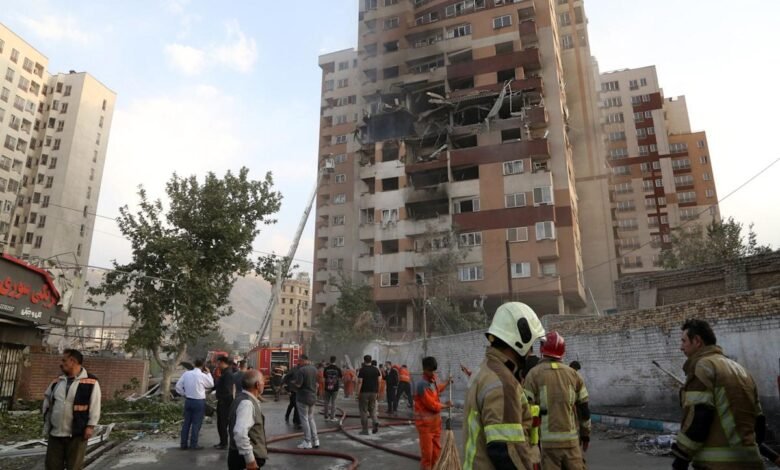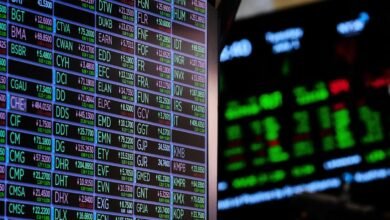
Kathleen Brooks, research director at XTB, said: “The dollar has proven its credentials as a haven and is the strongest currency in the G10 foreign exchange space on Friday.
“This is not a good day for risk, and the pound and the euro are both lower.”
Investors also snapped up US Treasury bonds, another safe asset.
Juan Perez, trading director at Monex, said: “The main concern remains tariffs and obstacles to global trade.
“When you actually have a physical situation and potential for armed conflict to be prolonged and to escalate, the US dollar and gold jump into [being] safe-haven assets. It’s a bit of a psychological reaction.”
Read the latest updates below.
Thanks for joining us on this blog today.
That’s all for now but you can read all the latest business stories and analysis here.
UK and European stock markets fell today after Israel launched strikes against Iran, sparking Iranian retaliation.
In London, the FTSE 100 closed down 0.4pc, while the FTSE 250 lost 1pc.
The pan-European Stoxx 600 fell 0.9pc, while France’s Cac 40 lost 1pc and Germany’s Dax dropped 1.1pc.
“If this is over quickly, we’ll see a fairly quick recovery and the markets basically are discounting the possibility that this drags out,” said Patrick Armstrong, chief investment officer at Plurimi Wealth.
“Our view is that it probably will be very short lived because Iran isn’t in a position to respond meaningfully, given the power dynamics between the two countries”.
Investors have also been unimpressed by the outcome of US-China talks earlier this week, and had doubts over an EU trade deal with the US before Trump’s July 8 tariff deadline.
A primary concern of oil analysts today was whether conflict between Israel and Iran would affect the Strait of Hormuz.
About a fifth of the world’s total oil consumption passes through the strait, or some 18m to 19m barrels per day.
Nikos Tzabouras, senior market analyst at Tradu.com, said: “Sustained upside [oil price rises] would require actual disruptions to physical flows – such as damage to Iran’s oil infrastructure or a blockade of the Strait of Hormuz, a key global chokepoint,” Mr Tzabouras said.
So far, no impact to oil flow in the region has been seen, according to Saxo Bank’s Ole Hansen.
He said: “No energy installations have been impacted by the Israeli strikes, so unless Iran decides to drag other nations, especially the US into the conflict, the risk of a supply disruption remains low and should over time reduce the risk premium.”
Iran could pay a heavy price for blockage of the Strait of Hormuz, which it and its neighbours rely on to ship oil to Asian markets, analysts said on Friday.
Analysts at JP Morgan said: “Iran’s economy heavily relies on the free passage of goods and vessels through the seaway, as its oil exports are entirely sea-based. Finally, cutting off the Strait of Hormuz would be counterproductive to Iran’s relationship with its sole oil customer, China.”
The US dollar’s gains today are a “psychological reaction”, an analyst has said.
Juan Perez, trading director at Monex USA, said: “This (Israel-Iran conflict) just landed on us but the main concern remains tariffs and obstacles to global trade.
“When you actually have a physical situation and potential for armed conflict to be prolonged and to escalate, the US dollar and gold jump into safe-haven assets. It’s a bit of a psychological reaction.”
The dollar jumped 0.3pc today as investors looked again to the US for safety.
“The dollar is reverting to that traditional role of safe haven, which we haven’t seen for months,” City Index strategist Fiona Cincotta said.
“We’ve got the equities markets coming lower in the safe-haven, risk-off trade and giving the dollar some much-needed boost from the lows that it was trading at.”
The S&P 500 has fallen 0.7pc this afternoon, but remains near record highs struck in February.
The dollar, which is down 9.5pc against a basket of six others this year, has traded virtually in lockstep with stocks since Donald Trump’s April 2 “liberation day” unveiling of tariffs shattered confidence in US assets.
That relationship began to erode on Friday, as investors embraced the dollar at the expense of stocks, crypto, industrial commodities and currencies such as the safe-haven Swiss franc and yen.
Wall Street’s main indexes fell this afternoon after Israel’s deadly strike on Iranian nuclear facilities inflamed tensions in the oil-rich Middle East and hit global markets.
The S&P 500 is down 0.8pc, the Dow Jones is down 1.3pc and the tech-heavy Nasdaq is down 0.9pc.
Israel has warned that the wide-scale strikes were the start of a prolonged operation to prevent Tehran from building an atomic weapon. Iran has promised a harsh response.
“We have major domestic policy uncertainty and now on top of that, you have geopolitical unrest, which not only is impacting oil markets, but the broader risk premium,” said Eric Teal, chief investment officer at Comerica Wealth Management.
Tame inflation figures, softer-than-expected producer price data and largely unchanged initial jobless claims earlier this week helped calm investor jitters around tariff-driven price pressures. However, Federal Reserve policymakers are widely expected to keep rates unchanged at their meeting next week.
Defence and energy firms are among the biggest risers on the London Stock Exchange today, with investors believing that heightened tensions in the Middle East could boost their profits. Meanwhile airlines have seen their shares slump.
BAE Systems is the biggest riser among the FTSE 100, adding 3.3pc, while British Airways’ owner IAG fell 4.5pc.
In the mid-cap FTSE 250, oil and gas group Harbour Energy jumped 5.4pc, but Wizz Air lost 6.3pc.
It came as Brent crude, the global benchmark for oil, soared as much as 13.2pc and is currently up by 6.9pc.
Investors looking for safe havens are shunning US Treasury bonds in favour of gold amid the turmoil caused by Israel’s attack on Iran, an economist has said.
Gold has climbed back towards a record high in the wake of the geopolitical uncertainty caused by Israel’s strikes.
However, US Treasury bond yields have actually edged higher to 4.37pc.
Traditionally in times of market upheaval US bond yields fall as investors turn away from riskier assets towards safer US government debt. Bond yields tend to fall as prices rise with increased demand.
Mohamed El-Erian, president of Queen’s College at Cambridge University, said: “As I’ve been highlighting recently, don’t look to US Treasuries for ‘safe haven’ or ‘flight to quality’ flows.
“Their yields barely budged after the Israeli attack on Iran. Instead, watch gold and silver.
“The flows are happening; they’re just not headed to Treasuries as historical experience would suggest.”
One of Wall Street’s biggest banks has more than doubled the chances of an oil crisis spreading around the world following Israel’s attacks on Iran.
JP Morgan said there was a 17pc chance of its “worst case scenario” playing out as a result of the renewed conflict in the Middle East.
The bank had assessed those chances at just 7pc on Thursday, before Israel killed Iran’s chief of the military staff General Mohammad Bagheri as part of a wave of strikes on Iran, including at Tehran’s enrichment facility Natanz.
It described its worst case scenario as “where supply impact extends beyond the reduction in Iranian oil exports and price reaction is exponential rather than linear”.
It had warned on Thursday that oil prices could surge to $120 a barrel in the event of an attack on Iran. Oil prices surged at their fastest pace in three years following the attack, although this was only as high as $78.
Investors fear disruption to trade through the Strait of Hormuz, a key trade route for some 30pc of the world’s seaborne oil trade and 20pc of the world’s liquefied natural gas supplies.
JP Morgan analyst Natasha Kaneva insisted the chances of the closure of the vital Strait was “very low, primarily because it has never occurred”.
Wall Street’s main indexes opened lower after Israel’s strikes on Iranian nuclear facilities.
The Dow Jones Industrial Average fell 388.1 points, or 0.9pc, at the open to 42,579.48.
The S&P 500 fell 44.7 points, or 0.7pc, at the open to 6,000.56​, while the Nasdaq Composite dropped 211.6 points, or 1.1pc, to 19,450.93.
The cartel of oil producing nations led by Saudi Arabia has insisted it sees no need for “unnecessary measures” to boost supply in the crude market following the attacks by Israel on Iran.
Opec secretary general Haitham Al Ghais intervened after the boss of the International Energy Agency said he was “actively monitoring the impact on oil markets”.
IEA executive director Fatih Birol had said the Paris based organisation was “ready to act if needed” if tensions in the Middle East threaten to disrupt oil supplies.
Opec chief Al Ghais said: “Today’s statement in social media by the IEA executive director regarding current market conditions and potential use of oil emergency stocks, raises false alarms and projects a sense of market fear through repeating the unnecessary need to potentially use oil emergency stocks.
“Similar assessments made in previous cases, most recently in 2022, contributed to higher market volatility and led to premature stock releases that ultimately proved unnecessary.
“It is crucial that commentary on market conditions be grounded in verified data and sound analysis, especially during sensitive geopolitical situations.”
European stock indexes were lower in afternoon trading after Israel attacked Iran.
The Cac 40 in Paris was down 0.8pc, reducing the scale of its losses on the day, while the Dax in Frankfurt was down 1.1pc.
Tony Redondo of Cosmos Currency Exchange said: “Stock markets will sell off. These are all predictable knee-jerk reactions.
“What happens next in the financial markets will depend on the scale of Iran’s response. They will talk a good game, but do they have the capacity actually to damage Israel? Probably not.”
US government borrowing costs initially fell amid a rush among investors towards safer assets.
However, as the day evolved, the focus has turned to the inflationary impact of oil.
US 10-year Treasury yields – the benchmark for the cost of servicing national debt – rose to 4.38pc, having touched a one-month low of 4.31pc earlier. Bond yields move inversely to prices.
Thomas Mathews of Capital Economics added: “With oil prices seemingly on the up, tariffs set to boost consumer prices in the US, and President Trump renewing his attacks on the Fed’s independence, the risk of a sustained rise in long-term inflation expectations has arguably risen a lot in recent months.
“There are still few signs of that dynamic in markets yet.
“But our sense is that the longer these tensions fester, the greater chance there is of a rise in long-term inflation compensation – and yields – that could prove difficult for central banks to undo.”
James Rossiter, an analyst at TD Securities, said: “This is a flight-to-safety event. But markets are struggling a bit and in the fixed income space you have an oil-price shock that is inflationary and so you should see markets expecting an even more hawkish Fed.
“On the other hand you have the flight-to-safety, which should push bond yields lower.”
Oil prices are likely to rise in the short term but the key question for the world economy is whether exports are affected by the closure of key trade routes, analysts have said.
SEB analyst Ole Hvalbye said the primary concern was whether the latest developments would affect the Strait of Hormuz.
Investors are concerned that Iran could disrupt trade through the key waterway as part of a response to Israel’s attacks.
In addition, about a fifth of the world’s total oil consumption passes through the strait, or some 18 to 19 million barrels per day of oil, condensate and fuel.
Richard Joswick, of S&P Global, said: “When Iran and Israel exchanged attacks previously, prices spiked initially but fell once it became clear that the situation was not escalating and there was no impact on oil supply.
“Oil price risk premiums could rise sharply if Iran conducts broader retaliatory attacks, especially if on targets other than in Israel.”
Donald Trump has told Iran to make a deal over its nuclear programme or there will be “nothing left”.
The US president said there would be “slaughter” if the regime did not come to the table.
“There has already been great death and destruction, but there is still time to make this slaughter, with the next already planned attacks being even more brutal, come to an end,” he wrote on his Truth Social platform.
Israel claimed to have hit 100 targets using 200 warplanes overnight, striking one of Iran’s nuclear facilities, wiping out dozens of its air defence systems and assassinating its military top brass.
US stock indexes were down sharply in premarket trading after Israel’s strikes on Iran.
The escalation of tensions in the Middle East has sent the price of oil more than 7pc higher, with Brent crude above $74 a barrel and US-produced West Texas Intermediate over $73.
Airline stocks dipped as the surge in crude prices raised concerns about higher fuel costs.
Delta Air Lines was down 4.6pc, United Airlines dropped 5pc, Southwest Airlines lost 2.1pc and American Airlines declined 3.9pc.
The strikes come just days ahead of a planned sixth round of nuclear talks between Iran and the United States.
Tensions had been building as US president Donald Trump’s efforts to reach a nuclear deal with Iran appeared to be deadlocked.
US Secretary of State Marco Rubio called the Israeli offensive a “unilateral action” and said Washington was not involved.
In premarket trading, the Dow Jones Industrial Average and S&P 500 were down 1.2pc, while the Nasdaq 100 had fallen 1.5pc.
Shares in London were lower after Israel’s attacks on Iran ramped up geopolitical tensions.
Britain’s domestically-focused FTSE 250 suffered its largest slump since April amid concerns that a jump in oil prices could push up inflation.
The mid-cap index was down 1.3pc, with gas producer Energean the worst hit after it said it had temporarily suspended the production and activities located off the coast of Israel. Its shares were down 6.5pc.
The FTSE 100 fell 0.4pc after closing at a record high on Thursday in a broad sell-off led by airline shares.
The UK’s flagship stock index remains less than 1pc off its record high of 8,908.82 reached in early March and remains on course for a weekly gain.
British Airways owner IAG was down 4pc, easyJet dropped 3.6pc and Wizz Air was down 3.1pc on the FTSE 250 as global airlines avoided airspace in the Middle East.
Thomas Mathews of Capital Economics said the “key channel through which this conflict affects the global economy and financial markets is energy prices”.
However, he said it would “probably take substantial escalation and actual damage to energy infrastructure in the Gulf for oil prices to rise much further and remain higher”.
Gold rose close to a record high after Israel launched attacks on Iran.
Bullion climbed as much as 1.8pc to more than $3,444 an ounce as investors sought out safe haven assets.
Gold is trading around $80 below a record of $3,500.10 an ounce reached in April after Iran vowed a “severe response” to the airstrikes.
Charu Chanana, an analyst at Saxo, said: “The risk of Iranian retaliation, including threats to US bases, adds to the uncertainty and supports haven flows
“With markets already on edge and risk sentiment deteriorating, gold is likely to stay bid as a hedge — not just against conflict risk, but also a possible spillover into inflation and volatility.”
Money markets indicate there is a slightly weaker chance of the Bank of England cutting interest rates this summer after the surge in oil prices.
Traders are betting there is an 82pc chance that policymakers will reduce borrowing costs in August, compared to an 85pc possibility priced on Thursday.
The Bank of England’s Monetary Policy Committee meets next week but is widely expected to leave interest rates on hold at 4.25pc.
Derren Nathan, an analyst at Hargreaves Lansdown, said: “It’s not just the outlook for Iranian exports that’s a concern but also the potential for disruption to shipping in the Persian Gulf’s Strait of Hormuz, a key route for about 20pc of global oil flows and an even higher proportion of liquified natural gas haulage.”
He added: “The escalation of military action adds another factor to consider for central bankers in an already complex world as they weigh up the inflationary impact of ever-changing tariff rates and a weakening outlook for jobs and growth.”
Britain has been left “unnecessarily exposed” to a potential shock from an Iran retaliation to Israel’s attack, a top economist has warned.
Simon French of Panmure Liberum said the risk of disruption in the Strait of Hormuz “will bring into sharp relief for the UK the folly of not maximising its domestic gas supply from the North Sea”.
He said: “Qatari supply may have fallen as a share of UK imports in recent years, but the spillover to global demand for Norwegian gas and US LNG leaves the UK unnecessarily exposed.
“For a government that has made welcome (long term) progress this week on stable nuclear baseload, the inability to look at the short term security of supply from the North Sea looks like a grave strategic error.”
The value of the dollar bounced back from three-year lows hit on Thursday as investors sought out safe havens from the turmoil in the Middle East.
The US currency was up 0.4pc against the pound, which was worth $1.356, and rose 0.4pc versus the euro, which fell to $1.154.
Investors also snapped up US Treasury bonds, considered another safe haven in times of turmoil.
The move sent the yield on the benchmark 10-year note – the return the US government promises to buyers of its debt – down as much as 4.7 basis points at one point to a one-month low of 4.31pc.
Yields rose across Europe, however, as investors switched to the safety of US sovereign debt.
Kathleen Brooks, research director at XTB, said: “The dollar has proven its credentials as a haven and is the strongest currency in the G10 FX space on Friday, followed by the yen and the Swissie.
“This is not a good day for risk, and the pound and the euro are both lower.
She added the fall in US bond yields “once again highlights the Treasury market as a beacon for the financial world when risks emerge”.
European gas prices rose at their fastest pace in a month after Israel launched a wave of attacks against Iran.
Dutch front-month futures, the benchmark contract for the Continent, jumped as much as 5.7pc to their highest level since April.
A wider conflict in the Middle East risks Iran disrupting shipments through the Strait of Hormuz, which is a key route for liquefied natural gas and oil.
Airline shares dropped at the start of trading after the price of oil jumped at its fastest pace in three years overnight.
British Airways owner IAG fell 7.1pc to the bottom of the FTSE 100 while EasyJet was close behind with a drop of 5.6pc.
However, there was a word of caution from some market watchers.
Michael Brown, an analyst at Pepperstone, said: “While the situation remains highly fluid, and incredibly uncertain, I would caution that we have all seen this playbook – in terms of market reaction – play out numerous times in the past.
“Financial markets are always incredibly quick to price in geopolitical fear, but tend to be equally quick to discount it again, seeing the risk premium fade in short order.
“Naturally, a day of headline-watching now awaits as participants brace for the likely Iranian response, as well as for any potential further signs of escalation.
“That said, and while some haven demand is obviously likely to persist as we move into the weekend, one must ask whether these geopolitical developments mean we should tear up our longer-term views.”
UK stock indexes fell at the start of trading amid fears Israel’s strikes against Iran could spark a wider conflict in the Middle East.
The FTSE 100 fell 0.5pc to 8,840.03 while the mid-cap FTSE 250 sank 0.7pc to 21,234.84.
The spike in oil prices increases the risk that Britain will face tax rises later this year, an analyst has warned.
Gervais Williams of investment manager Premier Miton said Israel’s attack on Iran will increase inflationary pressures and increase economic uncertainty.
This could lead to fewer interest rate cuts by the Bank of England and a rise in taxes by the Chancellor, he warned.
He told BBC Radio 4’s Today programme: “We’ve seen the oil price moving up and that is going to add to inflationary pressures unfortunately.
“It is likely that interest rates cuts will be less, or possibly even interest rate rises to come.
“The second feature is I think there will be quite a lot of economic uncertainty and I think that will lead to a government shortfall, unfortunately, versus their spending review recently.
“I think that will lead to potentially, unfortunately, to additional UK tax rises later this year.”
British and European stock markets were on track to open lower at the start of trading later after Israel ratcheted up tensions in the Middle East.
The FTSE 100 was poised for a fall of 0.5pc, although it is on track to fall by less than its European peers.
Oil giants Shell and BP are some of the biggest players in the UK’s flagship stock market, and stand to benefit from the jump in crude prices.
The Cac 40 in France and the Dax in Germany were on course to open more than 1pc lower.
Oil prices surged as traders tried to assess the risk of Israel’s strikes against Iran turning into a full conflict.
Brent crude hit its highest level since January 27 overnight at $78.50, while US-produced West Texas Intermediate hit $77.62, its loftiest since January 21.
Priyanka Sachdeva, an analyst at Phillip Nova, said: “Iran has announced an emergency and is preparing to retaliate, which raises the risk of not just disruptions but of contagion in other neighbouring oil producing nations too.
“Although Trump has shown reluctance to participate, US involvement could further raise concerns.”
US Secretary of State Marco Rubio on Thursday called Israel’s strikes against Iran a “unilateral action” and said Washington was not involved while also urging Tehran not to target US interests or personnel in the region.
MST Marquee senior energy analyst Saul Kavonic said the conflict would need to escalate to the point of Iranian retaliation on oil infrastructure in the region before oil supply is materially impacted.
He added that Iran could hinder up to 20m barrels per day of oil supply via attacks on infrastructure or limiting passage through the Strait of Hormuz, in an extreme scenario.
Iran’s Supreme Leader Ayatollah Ali Khamenei said Israel will receive “harsh punishment” following the attack that he said killed several military commanders.
Thanks for joining me.
The price of oil surged after Israel launched a wave of strikes in Iran, killing the head of its army and raising the risk of war in the Middle East.
Brent crude jumped by as much as 13pc to more than $78 a barrel – its biggest intraday gain since the early days of the Ukraine war in March 2022 – as uncertainty ramped up in global markets.
Gold rose as much as 1.7pc close to a record high and the US dollar bounced back from the three-year lows hit on Thursday as investors sought out safe haven assets.
Israel killed Iran’s chief of the military staff General Mohammad Bagheri as part of a wave of strikes on Iran, including at Tehran’s enrichment facility Natanz.
Iran said it would launch a “harsh and decisive” retaliation, pushing the price of oil higher and wiping out its losses so far this year.
Iran exports about 1.6m barrels of oil per day but the major worry for markets is that Tehran could choose to block the Strait of Hormuz, a critical shipping route in the Middle East, in the event of a full-blown conflict.
Warren Patterson, an analyst at ING, said: “We are back in an environment of heightened geopolitical uncertainty, leaving the oil market on tenterhooks and requiring it to start pricing in a larger risk premium for any potential supply disruptions.”
Here is what you need to know.
-
Trump ‘may have to force’ Fed on interest rates | US president attacks ‘numbskull’ Jerome Powell for failing to cut rates
-
Trump’s ‘big beautiful’ bill to make wealthy even richer and punish poor | Top 10pc of households to benefit from tax cuts while poorest to lose $1,600 a year
-
Sheffield howitzer factory to be ‘home of UK artillery production’ | New £25m site opens amid efforts to drive up defence spending
-
Reeves’s public sector obsession will crush the economy | Businesses will pick up the bill for the ever-growing state at the Chancellor’s autumn Budget
-
Ambrose Evans-Pritchard: Miliband is wasting billions on the wrong nuclear technology | Sizewell C is locking the country into a white elephant the same size as HS2
Oil prices surged after Israel attacked Iran’s capital amid the ramping up tensions over Tehran’s rapidly advancing nuclear program.
Brent crude, the international standard, was last up by $5.03 to $74.39 per barrel. US benchmark West Texas Intermediate oil rose by $5.19 to $73.23 per barrel.
Asian stock markets fell, with, Tokyo’s Nikkei 225 down 1.1pc to 37,763.00 while the Kospi in Seoul dropped 1pc to 2,889.55.
Hong Kong’s Hang Seng retreated 0.7pc to 23,877.19 and the Shanghai Composite Index lost 0.6pc to 3,381.40.
Australia’s S&P/ASX 200 drifted 0.2pc to 8,547.40.
On Wall Street, the Dow Jones Industrial Average added 0.2pc, to 42,967.62, while the S&P 500 rose about 0.4pc, closing at 6,045.26, and the Nasdaq gained 0.24pc, ending at 19,662.48.
In the bond market, the yield on benchmark 10-year US Treasury notes dropped to 4.368pc from 4.407pc a day earlier.
Broaden your horizons with award-winning British journalism. Try The Telegraph free for 1 month with unlimited access to our award-winning website, exclusive app, money-saving offers and more.
Don’t miss more hot News like this! Click here to discover the latest in Business news!
2025-06-13 16:58:00




